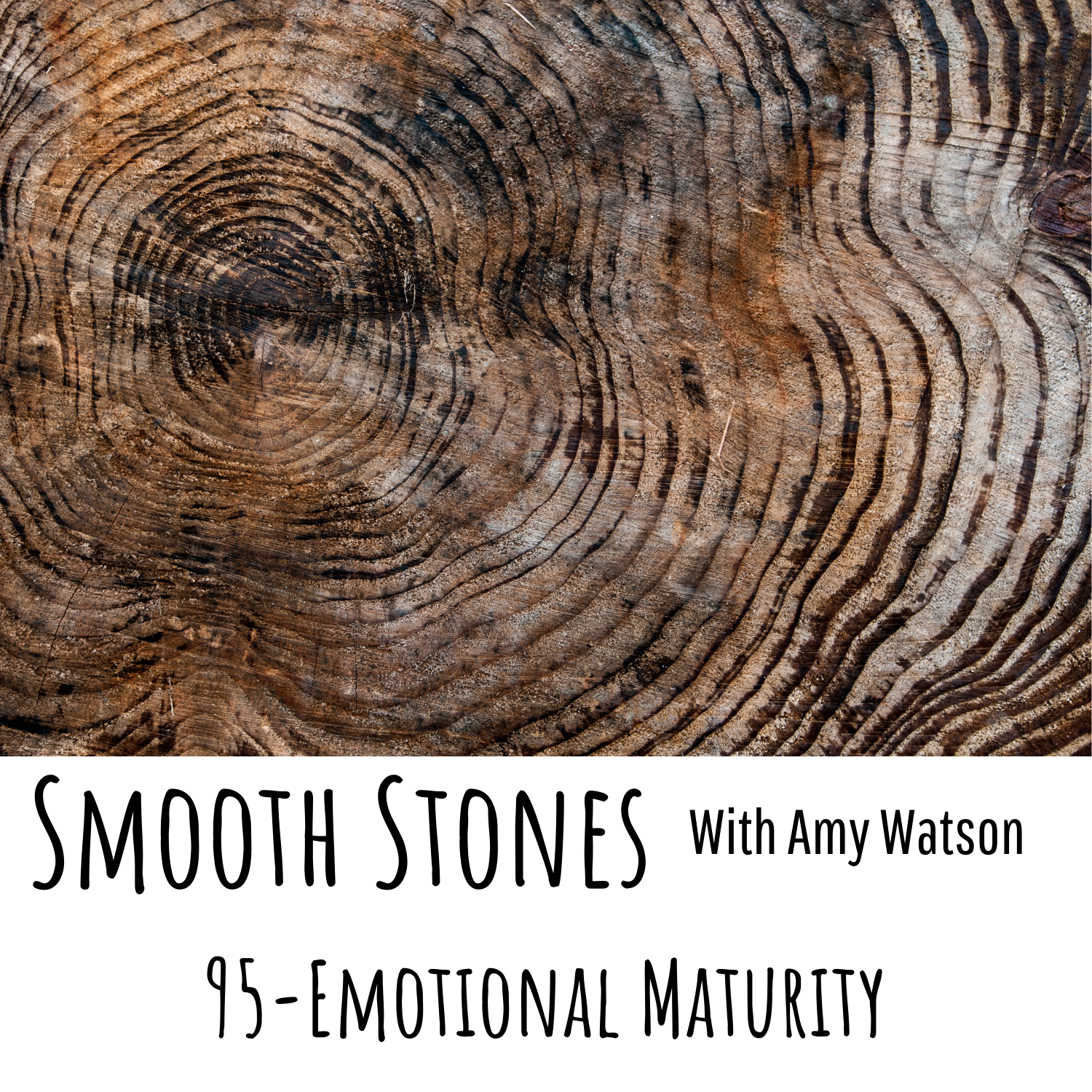Do you ever see a child completely melting down and wish they knew a better way to handle their emotions?
And yet later find ourselves melting down over something, too?
In today’s episode I’m going to teach you the difference between emotional immaturity and maturity so that you can stop feeling so controlled by what happens in your life.
It’s something they don’t teach you in school.
To schedule a free consult call, click HERE
Follow me on Instagram! @amy.smoothstonescoaching
Visit my website.
Photo by Canva
Music by ZingDog on Pond5
Transcription
Hey, how are you out there? I am excited to be with you today. And I am gonna jump right into today’s topic, no distractions. We are talking about emotional maturity today, and if you don’t know what that is, just follow along. It is a really a powerful subject that is gonna make such a big difference in your life when you implement this.
So let’s talk about what is being. Emotionally immature. This means that someone is dealing with their emotions like a child would. So we look at children, we know that their brains are not developed, right? They are not small adults. They literally can’t behave like an adult or handle their emotions like an adult because they are not, they just don’t have.
The capacity within their brains yet, so they will react to their emotions, which means whatever that looks like, throwing things, biting, yelling, whatever it is, they will act out. When they have big emotions, they don’t know how to handle it, so they act out or they will avoid emotions, right? If they don’t like something, they’re not gonna do it.
They’re gonna refuse. Um, especially some of those like younger kids, toddlers, we know that they are just like, No, I’m not going to daycare. Like I don’t like it there. I wanna be with my mom. I’m gonna avoid that situation. So we are adults here, but often we are still kind of immature in how we deal with our emotions.
It means that you don’t really take responsibility for your own emotions. You blame them on everything and everyone in your life. Now, this is pretty typical because no one taught us any differently in school. There wasn’t a class on emotional maturity. And there is also messaging everywhere that does teach us that other people cause our feelings and that we can cause theirs.
Just like don’t hurt little Sally’s feelings, like it’s gonna hurt mommy’s feelings if you don’t do what I ask you. Right. You’re making me mad. When you don’t listen, we say these things to children and we internalize it, and in the end we have adults who don’t understand that they are not the cause of other people’s emotions.
So we get this message that what happens in our lives is what controls how we feel. Even when you talk about miscarriage, there is often an assumption that you shouldn’t feel anything or you must be devastated and. Because of the miscarriage, right? Like because of what happened, because of how many weeks it was that should control.
I. How emotional you are and your reaction, and people rarely take into account the human being who is actually experiencing this miscarriage. Now, there’s nothing inherently wrong with being emotionally immature. We often use that word immature as kind of an insult. But I really want you to be objective today and just.
See the word for what it means, which is a level of development. It is part of a process. It’s what we’re here for, to learn and to grow. So why is it a problem for you? For many people, it really limits how they experience life. It puts all the power in other people’s hands and it keeps you constantly blaming.
It could be politicians, political parties, the economy, global warming formula shortages right now is just like really creating a lot of emotions in people who don’t recognize where their emotions come from. It could be your parents or your sister-in-law. You blame other things for how you feel and how you act and what results you’re getting in your life, and it is exhausting, especially in grief.
Now, I’m gonna touch on grief and emotional maturity in just a little bit, but I wanna ask you first, have you ever felt like this? Like you are a victim of your life? Most of us have, and it’s okay, but I wanna show you how you can start leveling up. First, you’ll wanna take a quick scan of your life, maybe even just today, maybe the last hour.
Have you been emotionally mature today, or are you doing a lot of blaming? So when we talk about this being immature, it often shows up as things that children do, right? Like temper tantrums, adult versions of temper tantrums. We’ve all seen them. Throwing a fit, yelling, lashing out. It can also show up as emotional eating and then blaming it on your bad day, right?
Like this made me do it. Someone who is stuck in emotional immaturity might sit by their phone on their due date waiting for their friend to call. Eating chocolate and posting in a Facebook support group about how horrible their friend is and how much they don’t care about them or their baby. They start thinking about how they can write the perfect text to let their friend know how much it hurt not to hear from them today and wanting to hurt them back for it.
They may even decide to never speak to this friend again and add more pain and isolation. In the end. This mom gets exactly what she didn’t want. But she blames it on her friend and she’ll never be able to heal because she’s going to wait until the friend fixes it by apologizing enough, and that’s probably never going to happen, especially since this friend probably has no idea what’s going on, and now she’s just locked out of this person’s life.
Can you see how powerless. This lost mom is in this situation. Can you see how her self-centered immature feelings are blinding her to any other option? Except that her friend doesn’t care about her. And when I say self-centered, I mean like a child. They are self-centered. That is part of their development.
That’s part of what keeps them alive, is making sure that their parents take care of them. Okay. But in this case, it’s very self-centered. When you cannot see anyone else’s point of view, can you see how this lost mom is reacting instead of communicating or taking care of her own needs? Staying in emotional immaturity is tough, you guys.
It really is. I wanted to give one more example that I see a lot when we talk about loss. There are all kinds of things that healthcare professionals say. So for example, maybe you go into the doctor’s office and you are getting a check on your pregnancy after loss, and the nurse walks in and she says, oh, is this your first baby?
And it can be, Upsetting when you believe that that nurse has control over your feelings and you start thinking things like, why didn’t she read my chart? Doesn’t she know I need extra care? Doesn’t she know I’m pregnant after loss? Doesn’t she know how hard this is? Right? It’s her fault that you’re feeling anxious or upset just because she asks a simple, small talk question.
And sometimes even people are like, I need to make this stop. I need to make all the doctors and nurses. Everyone at the grocery store never say the words. Is this your first? Right? Because when you’re emotionally immature, you believe that those words create feelings, but they don’t. They cannot. So let’s talk about how to change this, how to make it better.
Especially if you’ve been there, and I think we all have been there. So we’re not judging ourselves for that. We’re just learning something new. And when we know better, we do better. We know that Maya Angelou best quote. So the first question I wanna ask you right now is, how do I know if I’ve reached emotional maturity?
The answer is easy. You take responsibility for how you feel. A hundred percent. You create your own feelings. It is incredibly freeing to recognize this. So what it looks like when you have learned emotional maturity is you take responsibility for your pain and also your joy. You don’t expect other people to make you happy.
You don’t need other people to make you feel secure. You acknowledge that you are the only person who can hurt your feelings and that you do it with your own thought. I’m not saying this is easy, but it is so worth it to do the work to get to this place. If you watched the movie of Beautiful Day in the Neighborhood, you saw how Mr.
Rogers worked daily to cultivate this. If you think about Mother Teresa or the Dalai Lama, Or anyone else that you admire that that has this quality. These are people who have cultivated emotional maturity. They are great examples. Don’t tell yourself you can’t be like them. All of us can reach many heights we never thought we could.
If we work towards it now, none of these humans were perfect and none Were immune to uncomfortable feelings and experiences. But they chose peace. They chose emotional maturity, and you can too. Now you might have the question, is this different when you are grieving? I like to explain early grief. It’s like you have no skin, like all the skin has been taken off of your body, and so everything is more raw and more tender and things that didn’t bother you before, like a diaper commercial on TV now knocks you out for the rest of the day and you may avoid commercials for months after just so you don’t have to experience that.
Ever again, in my experience and what I see with my clients, you absolutely can cultivate emotional maturity in grief, but it’s a bit like starting over and relearning how to deal with emotions. And if you were already blaming your emotions on things outside of you, because no one ever told you any different than when you’re grieving, you are gonna continue that pattern.
So I highly encourage you to work on deep acceptance of yourself. First, right in the middle of all the uncomfortable emotions and not understanding where they’re coming from. I teach that circumstances are the facts in our lives, and you get to decide what you want to think about them. Many people misunderstand this to mean that you shouldn’t feel anything about your baby dying or that you should just change your thoughts so you aren’t so sad.
But that’s not what it means at all when you are emotionally. Immature in grief. It just means you are figuring out something new that you haven’t experienced before. It’s much stronger and more unique than other sad things in that you’ve experienced in your life. Even if you’ve had multiple losses, you’ve never had this many losses.
So that’s where you need to be really kind to that part of you that is in grief, infancy. Some things that are really common in this stage are pushing away all the feelings or completely sinking down into a hole that you are sure you are never going to come out of. Neither of these things give you much hope for the future.
It’s looking pretty bleak. I like to use the example of a teenager who has been dumped by her first love. She is covered in a pile of tissues and chocolate. Everything is dramatic. Life is over. She wants to be homeschooled and never have to go see this boy again. She makes it mean she’s worthless and no one will ever love her.
She can’t listen to her parents or friends who tell her that it will get better. She cannot see it. This is how we are in grief at the beginning, but just like that teenager, you have a lot of good in front of you. You are going to be okay and better than okay. And someday you’re gonna tell the story of how you pulled yourself out of the hole and you built a beautiful life.
When my daughter Lauren died at 39 and a half weeks, I didn’t know how I would get through the grief, but I looked around and I saw people who had done it, and I thought to myself, I want that. I thought if they can do it, so can I. And I thought I’m gonna do everything I can to live a good life for me, my family, and for Lauren.
So emotional maturity and grief looks a lot like that. It doesn’t mean you don’t hurt, but you get to know grief. You understand that it’s coming from a deep love and missing your baby and all that you dreamed for them. It looks like apologizing on the hard days when you lose your cool and not making it mean that you are failing.
It looks like letting yourself cry and letting yourself laugh. It looks like learning to manage your emotional energy and adjust as necessary. It looks like not expecting other people to make you feel better or show up in any other way than how they are now. It looks like saying what you want and need with confidence.
It looks like allowing for hope. Grief isn’t this monster that possesses you. It’s a natural response to loss. Once you understand it and stop fighting it, you can become besties with it. And to me that is emotional maturity and grief, and it is totally possible. I show my clients how to get this level of peace even in the deepest pain.
If you wanna drop the drama that comes with emotional immaturity and start feeling a lot more in control, I’ve got you. I will help you find yourself again after loss. When you feel in alignment with you, things are gonna get better fast. So go in the show notes and sign up for a consult call. I want you to be kind to yourself in this.
It will go in waves and you’ll probably never be perfect at it. You’re still a human. Just start noticing places where you can see that you’re operating in emotional immaturity and get really curious about what’s going on. So do some thought downloads, do some models, and keep reminding yourself that it’s not them.
It’s you that is creating all the problems for yourself, and you always have choices. Cultivating emotional maturity takes work. It takes effort, but it is so worth it. All you need to do is take the first step, start thinking about what would be different if you stopped blaming others or your circumstances for how you feel.
I can promise you it’s one of the most freeing things I’ve ever learned, and I want you to learn it on a deep level for yourself. What I can give you here on the podcast is just a taste. When you come and coach with me, you are going to get to not only figure this out, but practice it and practice it.
And continue learning until you’ve mastered it. When you’ve mastered emotional maturity, your life is going to be so much better. Your grief is gonna be so much easier. You are gonna feel so much more like yourself than you ever have before, possibly even before your baby died. It’s that powerful. I want you to have it.
Go in the show notes, sign up for a consult, call come and talk to me. I’ll see you next time.




